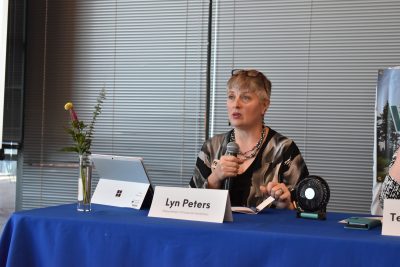On May 30, the Whatcom Asset Building Coalition (WABC) held its annual Spring Summit at the Bellingham Cruise Terminal. The theme was “Unmasking Fraud & Scams: Detect, Prevent, Respond,” and it was designed to help our community learn how to identify, prevent, and respond to financial scams.
The WABC is an important collaboration between community partners and administered by Opportunity Council. The coalition is dedicated to fostering collaboration in the community to increase the financial stability of people in Whatcom County. In addition to providing resource guides and other community education resources, the coalition also holds an annual summit with topic experts to educate service providers and community members on topics related to financial stability.
Unmasking Fraud & Scams: Summit Highlights
Keynote Address by Joe Kanada
Joe Kanada, the Managing Assistant Washington State Attorney General with the Consumer Protection Division, delivered a compelling keynote address. He provided an insightful overview of the current landscape of financial scams and shared the measures being taken by the Attorney General’s office to address these issues. Joe emphasized the importance of community awareness and staying informed to protect against fraud.
Spirited Panel Discussion on Common Scams

Lyn Peters, Director of Communications, Financial Education and Outreach at the Washington State Department of Financial Institutions shares her thoughts during the panel discussion.
The event featured a panel discussion with state and local fraud and scam experts. Featuring Lyn Peters from the Washington State Department of Financial Institutions, Teresa Glidden from the Office of the Secretary of State Corporations & Charities Division; Elena Huizar from the Office of the Attorney General; and Opportunity Council’s very own Colby Henderson, the panelists shared their passion for protecting the community by sharing valuable insights into the latest trends in consumer protection, how scams are constantly evolving, and the resources available for reporting fraudulent activities.
In particular, panelists warned that every person is a potential target to scammers. Especially with the rise of AI that has the ability to “spoof” voices and identities, the scams are becoming more sophisticated and harder to detect. The panelists even shared ways they themselves have been duped.
Pig Butchering: A Long Con with Devastating Consequences
Both the event panel and keynote described several scams, including scams by individuals impersonating government agencies, businesses and even non-profits like Opportunity Council. New technologies also make it easier for scammers to impersonate a person’s loved ones and both Kanada and the expert panel brought up a common new trend: Pig Butchering. A practice possibly more disturbing than the name, Pig Butchering involves scammers targeting individuals and building trust and relationships over time until their victim believes they have a real friendship or romance. The scammer then convinces their victim to invest in or transfer them money—sometimes to the tune of hundreds of thousands of dollars.
Unable to attend? Here’s What to Know:
Common Signs of Financial Scams
Understanding how to recognize scams is essential. Here are some common signs to be aware of:
- Unsolicited Contact: Be cautious of unexpected phone calls, emails, or social media messages asking for any kind of personal information.
- Pressure to Act Quickly: Scammers often create a sense of urgency or emergency to prompt immediate action without proper verification.
- Requests for Personal Information: Legitimate organizations usually do not ask for sensitive information like Social Security numbers or bank details through unsolicited communications.
- Too Good to Be True Offers: Be skeptical of offers that promise large sums of money, prizes, or guaranteed returns with little to no risk.
- Untraceable Payment Methods: Be wary if asked to make payments via gift cards, wire transfers, or cryptocurrency. These methods are difficult to trace and often used by scammers.
- Secrecy: Be skeptical of unsolicited contacts that discourage you from checking with other people, calling for advice, or verifying their identity.
The Financial Toll of Fraud in Washington State
The financial impact of scams in Washington State is significant. According to the FTC, Washington residents reported losses of over $240 million due to scammers in 2023. That is more than three times the amount reported in 2020, yet according to Kanada is still likely only a fraction of the true amount lost due to peoples reluctance to report fraud. Despite being an undercount, the sharp increase underscores the need for continued education and preventative measures to reduce stigma and protect the community.
Protecting Yourself & Others From Fraud & Scams
While scams continue to evolve and fraudsters continue to find new ways to scam individuals out of their assets and savings, there are a few key things everyone can do to protect themselves and their loved ones:
- Stay Informed: Regularly update yourself on the latest scam tactics and trends.
- Verify Sources: Always confirm the legitimacy of anyone requesting personal or financial information. Do not use links or phone numbers provided by the contact to verify identity.
- Report Scams: If you suspect a scam or fall victim to a scam, report it to the FTC, law enforcement, and the Washington State Attorney General’s office.
- Use Strong Security Measures: Protect your accounts with strong, unique passwords, enable multi-factor authentication, and regularly monitor your financial statements. Have a security word with loved ones that they know to use to verify each other’s identity in case of an emergency where you can not physically confirm the situation with each other.
- Think before you click (or scan): Be wary of any hyperlinks in unsolicited emails or text messages. Do not scan QR codes that are not from a verified source or click URLS that have been shortened by a third party.
Additional Resources and Support
Attendees also had the chance to connect with resources from local organizations such as North Coast Credit Union, the Bellingham Police Department, the Whatcom County Library System, and Futures Northwest. These organizations provide valuable support and information to help protect against scams.
Conclusion
The Fraud Summit was a great reminder of the importance of staying alert and informed about financial scams. By recognizing the common signs of fraud and understanding its financial impact on our state, we can better protect ourselves and our community. Stay vigilant, informed, and proactive in safeguarding your finances.
For more information and to register for future events, please visit Whatcom Asset Building Coalition.






